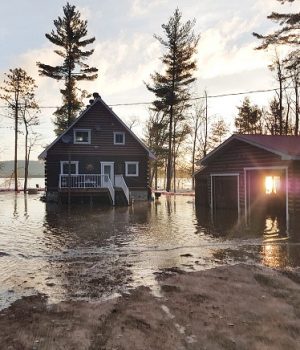
WHITEWATER REGION — The Special Advisor delivered his report on flooding to the Ontario government on October 31. In his review, Doug McNeil stated this year’s record-setting flooding in many parts of the province was caused by a combination of weather conditions, not human error or negligent operations.
In July, John Yakabuski, Minister of Natural Resources and Forestry named Mr. McNeil as the Special Advisor on Flooding and charged him with conducting an independent review of flood management and 2019 flooding events in Ontario. “The safety of the public and the protection of our communities is our number one priority,” said Minister Yakabuski.
“After last spring’s flooding, we recognized that we needed an external perspective on the current roles and responsibilities of the governments, agencies and organizations involved in flood management – someone who could provide independent advice on improvements we can make.”
Mr. McNeil made the following statement on his findings: “Based on an analysis of the information available for all of the systems that experienced flooding in 2019, nothing points to human error or the negligent operation of water control structures as the cause of the flooding. The sheer amount of water (snow and rainfall) on the landscape directly contributed to the flooding. Measures taken by water managers everywhere were effective in reducing the magnitude of flooding and associated damages throughout the drainage basins.”
Since the spring, the government has attempted to help increase the province’s resiliency to flooding by opening the Green Stream infrastructure fund of the Investing in Canada Infrastructure Program (ICIP), which enables smaller municipalities to access approximately $200 million in federal and provincial funding to invest in critical water, waste water and storm water projects. The government also launched a $1 million pilot project under the Municipal Disaster Recovery Assistance program to help municipalities rebuild damaged infrastructure to make it more resilient to extreme weather.
“Mr. McNeil looked carefully at the core components of the Province’s approach to emergency management relative to last spring’s flood season and found that steps taken by individuals, municipalities, dam owners, and other agencies were effective in reducing further potential damage to communities,” said Minister Yakabuski. “We are pleased by this conclusion, and we appreciate Mr. McNeil’s practical advice for the Province and other parties to help us to become more flood resilient.”
The report makes 66 recommendations in the areas of education and outreach, guidance and governance, response and recovery, and collaboration. The education and outreach section recommends raising awareness of flood risks and mitigation measures. The guidance and governance section recommends land use planning policies and practices, water management practices, floodplain mapping, roles and responsibilities, flood forecasting and warning capabilities. The response and recovery recommendations are in regards to emergency response, disaster recovery programs, funding and waste management.
The report highlights include the complexity of flood management and the contributions from various levels of government, organizations and individuals across Ontario. In addition to provincial ministries, the report also lays out recommendations for the International Joint Commission, the Ottawa River Regulation Planning Board and Ontario Power Generation.
The government has attempted to speed up the process for property owners to get the approvals they need to repair flood-related damage to shorelines and Ontario has already committed to taking actions to address recommendations from the Special Advisor’s report. Modernizing regulations under the Conservation Authorities Act to have conservation authorities focus on their core mandate of protecting people and property from flooding and other natural hazards is one of the examples given.
The government also states they will launch a comprehensive review of Ontario’s natural hazard technical guides and guidelines related to flood forecasting and warning. They also want to ensure the continued investment of over $4.7 million in the stream gauge network to enable flood forecasting and flood warnings. This will help municipalities to better prepare for flood events. The Province is reviewing the remaining recommendations along with its partners and said they will work together to increase the awareness of flood risks and help to build Ontario’s resiliency to flooding. The full flood report is available on the Government of Ontario’s website.






![Kenopic/Smith Auction [Paid Ad]](https://whitewaternews.ca/wp-content/uploads/2018/10/advertising-100x75.jpeg)

